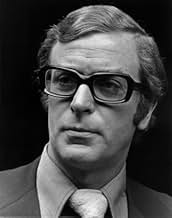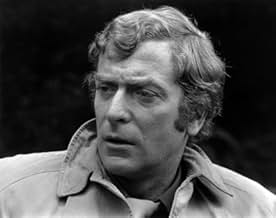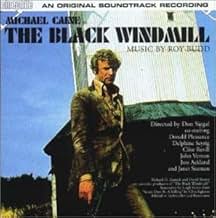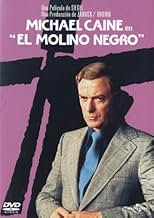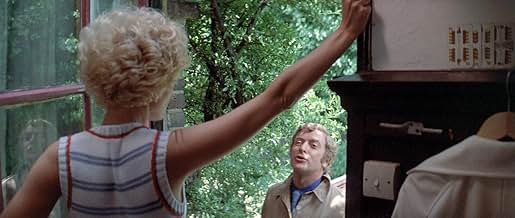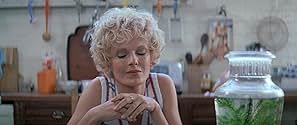VALUTAZIONE IMDb
6,3/10
3568
LA TUA VALUTAZIONE
Il figlio di un agente britannico viene rapito e tenuto in ostaggio.Il figlio di un agente britannico viene rapito e tenuto in ostaggio.Il figlio di un agente britannico viene rapito e tenuto in ostaggio.
- Regia
- Sceneggiatura
- Star
Recensioni in evidenza
I caught this film when it was shown on British television recently and was surprised that I had never previously heard of it, despite the fact that it stars an actor as iconic as Michael Caine and was made by a director as famous as Don Siegel. The "black windmill" of the title is one of the two Clayton Windmills (known locally as "Jack and Jill") on the South Downs near Brighton; this windmill plays an important part in the plot.
As in "The Ipcress File", Caine plays a British secret service agent, but his character here, John Tarrant, is very different to Harry Palmer. Whereas Palmer was a working-class outsider, a former Army sergeant who was virtually blackmailed into joining the secret service to avoid a criminal charge, Tarrant is an establishment insider, part of the officer class. (He holds the rank of Major). He is engaged in an undercover operation to counter the activities of a gang of arms smugglers selling weapons to terrorists in Northern Ireland. (The film was made in 1974 when the Northern Irish troubles were at their height).
The film starts with Tarrant's young son David being kidnapped and held to ransom. The kidnappers appear to have a detailed knowledge not only of Tarrant's family circumstances but also of the work he is engaged on; as their ransom they demand a valuable quantity of uncut diamonds which he has recently acquired to fund his intelligence work. Tarrant initially believes that the kidnappers are connected either to the arms dealers or to the terrorists for whom they are working, and confides in his superior, Cedric Harper. As matters progress, however, he begins to wonder whether matters are really as they seem and whether he can really trust his colleagues.
This is far from being Caine's worst film. (For an actor of his distinction he made more than his fair share of dreadful ones, "Blame It on Rio" and "Ashanti" being two that come to mind). It does, however, highlight one of his weaknesses as an actor, namely that in the early part of his career he was not very good at conveying strong emotions. Most of his iconic roles, at least from this period, involved him playing characters who, for one reason or another, avoid showing much emotion. This could be because they need to keep up the "stiff upper lip" (his characters in "Zulu" and "Battle of Britain"), because they hide their feelings beneath a mask of impassivity (Jack Carter), because they deliberately avoid emotional commitment (Alfie Elkins) or because they try and distance themselves from their feelings through cynicism and irony (Frank in "Educating Rita"). Certainly, some of his more mature performances do show greater emotional depth, such as "The Honorary Consul" and "The Quiet American", but in "The Black Windmill" he is rather wooden, never suggesting the anguish and anxiety of a man whose son is being held for ransom.
Some of the acting is better; Janet Suzman as Tarrant's estranged wife Alex provides the emotional conviction that Caine's performance lacks, while Donald Pleasence is very effective as the smooth but unsympathetic and possibly duplicitous Harper. The film as a whole is a professionally made thriller, if not a very original one, but an essentially American director like Siegel was not the most natural choice to direct a British spy thriller like this one. "The Black Windmill" is never going to rank on his filmography as highly as the likes of "Dirty Harry" and "The Shootist". 6/10
As in "The Ipcress File", Caine plays a British secret service agent, but his character here, John Tarrant, is very different to Harry Palmer. Whereas Palmer was a working-class outsider, a former Army sergeant who was virtually blackmailed into joining the secret service to avoid a criminal charge, Tarrant is an establishment insider, part of the officer class. (He holds the rank of Major). He is engaged in an undercover operation to counter the activities of a gang of arms smugglers selling weapons to terrorists in Northern Ireland. (The film was made in 1974 when the Northern Irish troubles were at their height).
The film starts with Tarrant's young son David being kidnapped and held to ransom. The kidnappers appear to have a detailed knowledge not only of Tarrant's family circumstances but also of the work he is engaged on; as their ransom they demand a valuable quantity of uncut diamonds which he has recently acquired to fund his intelligence work. Tarrant initially believes that the kidnappers are connected either to the arms dealers or to the terrorists for whom they are working, and confides in his superior, Cedric Harper. As matters progress, however, he begins to wonder whether matters are really as they seem and whether he can really trust his colleagues.
This is far from being Caine's worst film. (For an actor of his distinction he made more than his fair share of dreadful ones, "Blame It on Rio" and "Ashanti" being two that come to mind). It does, however, highlight one of his weaknesses as an actor, namely that in the early part of his career he was not very good at conveying strong emotions. Most of his iconic roles, at least from this period, involved him playing characters who, for one reason or another, avoid showing much emotion. This could be because they need to keep up the "stiff upper lip" (his characters in "Zulu" and "Battle of Britain"), because they hide their feelings beneath a mask of impassivity (Jack Carter), because they deliberately avoid emotional commitment (Alfie Elkins) or because they try and distance themselves from their feelings through cynicism and irony (Frank in "Educating Rita"). Certainly, some of his more mature performances do show greater emotional depth, such as "The Honorary Consul" and "The Quiet American", but in "The Black Windmill" he is rather wooden, never suggesting the anguish and anxiety of a man whose son is being held for ransom.
Some of the acting is better; Janet Suzman as Tarrant's estranged wife Alex provides the emotional conviction that Caine's performance lacks, while Donald Pleasence is very effective as the smooth but unsympathetic and possibly duplicitous Harper. The film as a whole is a professionally made thriller, if not a very original one, but an essentially American director like Siegel was not the most natural choice to direct a British spy thriller like this one. "The Black Windmill" is never going to rank on his filmography as highly as the likes of "Dirty Harry" and "The Shootist". 6/10
Every now and again you come across a film that's somewhat a letdown, even when those expectations are kept at bay. Don Siegel's mid-70s espionage-thriller 'The Black Windmill' that starred Michael Caine falls in that category. If anything it was that title (which the story is adapted off Clive Egleton's novel "Seven Days to a Killing") which caught my eye. Siegel's adapt, controlled workhorse direction tackles the subdued material with little suspense, but constructing something tight, sullen and dry with the main focus on building something out of its elaborately knotty (but dubious) premise. It's a true pot-boiler entangled with twists. While the material is stimulating (with some good work by the solid support performances and an occasionally witty line) and the sturdy set-pieces are competently crafted, however the pacing is too blotchy and in the end it builds to really nothing. It loses some weight due to the lack of suspense and urgency with a crackerjack climax that's just too quick. Michael Caine's composed performance is strongly delivered, and John Vernon makes for an ideally icy and conniving villain. Donald Pleasance is delightfully squirmy (which his character likes to really fiddle with that moustache) and Janet Suzman provides some fire. Delphine Seyrig and Clive Revill offer able support too. Roy Budd's sizzling, but low-key music score works well and Ousama Rawi lenses it with a great illustrative eye. Siegel's touch is evident in both of those devices. An unexceptional feature, but still its well organised and performed.
An interesting spy thriller starring Michael Caine.
The film is interesting and well depicts the atmosphere and look of those years. The cinematography is excellent and here we have an authentic look from that time. The music is great and fits in perfectly with the atmosphere of the film.
The characters are interesting, and the story slowly builds and the atmosphere becomes more tense as the film progresses. The details are subtle and realistic and enhance the impression of the film.
Michael Caine is excellent in the role of a cold-blooded spy who tries to save his son.
An interesting film with a tense atmosphere.
The film is interesting and well depicts the atmosphere and look of those years. The cinematography is excellent and here we have an authentic look from that time. The music is great and fits in perfectly with the atmosphere of the film.
The characters are interesting, and the story slowly builds and the atmosphere becomes more tense as the film progresses. The details are subtle and realistic and enhance the impression of the film.
Michael Caine is excellent in the role of a cold-blooded spy who tries to save his son.
An interesting film with a tense atmosphere.
Like a forerunner of Taken crossed with a '60s espionage movie (Harry Palmer with a dash of Bond), The Black Windmill stars Michael Caine as Major John Tarrant, an MI6 agent whose son is kidnapped and held for ransom. When his superiors refuse to part with the asking price - half a million in uncut diamonds - Tarrant goes rogue, stealing the stones to make the payoff.
Even though the plot for this thriller isn't quite water-tight, the assured direction from Don Siegel (Dirty Harry) and strong performances from a great cast (which includes Donald Pleasence, John Vernon, Clive Revill and Joss Ackland) ensure that the film is an entertaining ride, with some well staged action sequences and plenty of intrigue.
Fans of star Caine will not be disappointed - he puts in a fine performance as the calm, collected spy pushed to take matters into his own hands - whilst Vernon makes for a suitably cruel foe. Both actors meet for a mid-movie engagement in which Tarrant test-runs a very Bond-esque briefcase armed with a rocket, and again for a satisfying shootout in the titular structure.
While not a 'classic' like Dirty Harry, largely thanks to the awkward questions that arise from the twisty plot and uneven pacing, there is still plenty to enjoy here for fans of the genre.
6.5/10, rounded up to 7 for IMDb.
Even though the plot for this thriller isn't quite water-tight, the assured direction from Don Siegel (Dirty Harry) and strong performances from a great cast (which includes Donald Pleasence, John Vernon, Clive Revill and Joss Ackland) ensure that the film is an entertaining ride, with some well staged action sequences and plenty of intrigue.
Fans of star Caine will not be disappointed - he puts in a fine performance as the calm, collected spy pushed to take matters into his own hands - whilst Vernon makes for a suitably cruel foe. Both actors meet for a mid-movie engagement in which Tarrant test-runs a very Bond-esque briefcase armed with a rocket, and again for a satisfying shootout in the titular structure.
While not a 'classic' like Dirty Harry, largely thanks to the awkward questions that arise from the twisty plot and uneven pacing, there is still plenty to enjoy here for fans of the genre.
6.5/10, rounded up to 7 for IMDb.
Don Siegel will always be remembered as the man who gave us Invasion Of The Bodysnatchers and Dirty Harry, as well as being the mentor of Clint Eastwood when he was just starting out in the acting business. Here he tackles very atypical material with a low-key British spy thriller based on the book Seven Days To A Killing by Clive Eggleton. Although this is not really Siegel's kind of thing, he manages to coax sound performances from an impressive cast, and gets across a certain degree of excitement. From time to time the suspense slackens a little, but on the whole this is an engaging enough potboiler.
Major John Tarrant (Michael Caine) is a secret agent who is distraught to learn that his son has been kidnapped by a gang who want a batch of diamonds for his safe return. Tarrant's boss Cedric Harper (Donald Pleasance) has never got on well with Tarrant, and even goes so far as to suggest that maybe the kidnapping is an elaborate double-cross hatched by Tarrant himself in order to get hold of the diamonds. Supported by his wife Alex (Janet Suzman), Tarrant steals the diamonds needed for his son's safety, and attempts to elude his own colleagues plus the police long enough to secure the return of the young boy.
Critical opinion at the time seemed to be of the view that The Black Windmill was a bad film. Generous critics were kind enough to call it average. Perhaps everyone still had Siegel's extraordinarily good Dirty Harry fresh in their memories and were unable to accept that he couldn't always make films of that standard. The Black Windmill, while stilted and a touch dry in parts, is certainly not a full-scale dud. It has interesting plot twists, good acting (always good to see John Vernon in any of his '70s villainous roles), intriguing character clashes, and a nice sense of genre. I'd rather have a low-key thriller like this than one of the modern spectacular-but-empty popcorn actioners. Try not to be influenced by the negative buzz.... give The Black Windmill a try. It's no classic, but it's better than you might expect.
Major John Tarrant (Michael Caine) is a secret agent who is distraught to learn that his son has been kidnapped by a gang who want a batch of diamonds for his safe return. Tarrant's boss Cedric Harper (Donald Pleasance) has never got on well with Tarrant, and even goes so far as to suggest that maybe the kidnapping is an elaborate double-cross hatched by Tarrant himself in order to get hold of the diamonds. Supported by his wife Alex (Janet Suzman), Tarrant steals the diamonds needed for his son's safety, and attempts to elude his own colleagues plus the police long enough to secure the return of the young boy.
Critical opinion at the time seemed to be of the view that The Black Windmill was a bad film. Generous critics were kind enough to call it average. Perhaps everyone still had Siegel's extraordinarily good Dirty Harry fresh in their memories and were unable to accept that he couldn't always make films of that standard. The Black Windmill, while stilted and a touch dry in parts, is certainly not a full-scale dud. It has interesting plot twists, good acting (always good to see John Vernon in any of his '70s villainous roles), intriguing character clashes, and a nice sense of genre. I'd rather have a low-key thriller like this than one of the modern spectacular-but-empty popcorn actioners. Try not to be influenced by the negative buzz.... give The Black Windmill a try. It's no classic, but it's better than you might expect.
Lo sapevi?
- QuizDonald Pleasence came up with the idea for his character to constantly use a hankie.
- BlooperIn the roof garden where Tarrant's wife sends the toy fire engine down the slide towards him, as Tarrant turns to re-enter the house, the reflection of the boom mic can briefly be seen in the glass doors behind.
- Citazioni
Cedric Harper: He knew my name and he knew the name of this department. Both of these things imply serious breaches of security.
- Curiosità sui creditiThe opening credits are formed from images of children's alphabet blocks.
- ConnessioniReferences Tutti insieme appassionatamente (1965)
- Colonne sonoreUnderneath the Spreading Chestnut Tree
(uncredited)
(trad.)
I più visti
Accedi per valutare e creare un elenco di titoli salvati per ottenere consigli personalizzati
- How long is The Black Windmill?Powered by Alexa
Dettagli
Botteghino
- Budget
- 1.500.000 USD (previsto)
Contribuisci a questa pagina
Suggerisci una modifica o aggiungi i contenuti mancanti


